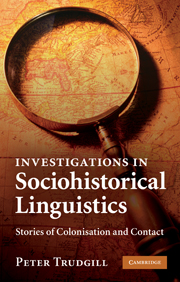Book contents
- Frontmatter
- Contents
- List of maps
- List of tables
- Acknowledgements
- Prologue: Colonisation and contact
- 1 What really happened to Old English?
- 2 East Anglian English and the Spanish Inquisition
- 3 On Anguilla and The Pickwick Papers
- 4 The last Yankee in the Pacific
- 5 An American lack of dynamism
- 6 Colonial lag?
- 7 “The new non-rhotic style”
- 8 What became of all the Scots?
- Epilogue: The critical threshold and interactional synchrony
- Bibliography
- Index
3 - On Anguilla and The Pickwick Papers
Published online by Cambridge University Press: 02 December 2010
- Frontmatter
- Contents
- List of maps
- List of tables
- Acknowledgements
- Prologue: Colonisation and contact
- 1 What really happened to Old English?
- 2 East Anglian English and the Spanish Inquisition
- 3 On Anguilla and The Pickwick Papers
- 4 The last Yankee in the Pacific
- 5 An American lack of dynamism
- 6 Colonial lag?
- 7 “The new non-rhotic style”
- 8 What became of all the Scots?
- Epilogue: The critical threshold and interactional synchrony
- Bibliography
- Index
Summary
The principal chronological focus of the previous chapter was on historical-sociolinguistic events involving the English language in the 1500s and 1600s. This new investigation once again starts where the previous one left off, in the 1600s; but geographically the focus is now greatly expanded, reflecting the world-wide expansion of the English language itself which began in this period. In 1600, English was a rather small and unimportant language on the world stage, and had no very significant role as a foreign or second language anywhere. It was spoken natively in a very small area of the globe indeed: it was the native language only of the indigenous population in most of England and in the south and east of Scotland. It was, however, absent from much of Cornwall, and from Welsh-speaking parts of Shropshire and Herefordshire; most of Ireland was Irish-speaking; nearly all of Wales was still Welsh-speaking; the Highlands and Hebridean Islands of Scotland spoke Gaelic; Orkney and Shetland spoke Scandinavian Norn; the Isle of Man was Manx-speaking; and the Channel Islands were still Norman French-speaking.
However, during the course of the 1600s this situation changed dramatically. As a result of colonisation, English arrived as a native language in Ireland, in what is now the United States, and in Bermuda, Newfoundland, the Bahamas, and the Turks and Caicos Islands.
- Type
- Chapter
- Information
- Investigations in Sociohistorical LinguisticsStories of Colonisation and Contact, pp. 61 - 91Publisher: Cambridge University PressPrint publication year: 2010



